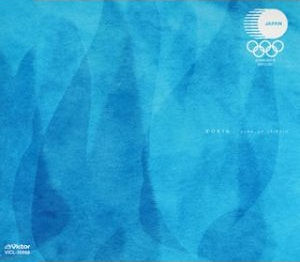
Akiko Yoshida is a Japanese singer and songwriter performing under the stage name Kokia. Her most well known songs are "Arigatō..." and "The Power of Smile" (which topped at No. 8 in the singles chart). She is also recognized for her numerous contributions to anime/game soundtracks, the most notable being "Ai no Melody/Chōwa Oto " for the film Origin: Spirits of the Past, "Follow the Nightingale" for the game Tales of Innocence, "Tatta Hitotsu no Omoi" for the anime Gunslinger Girl: Il Teatrino, "Dance of the Spirits" for the anime “Ancient Magus' Bride” and "For Little Tail" for the game Tail Concerto.

The discography of Japanese singer Kokia consists of fourteen studio albums, five compilations albums, four extended plays and 35 singles. Kokia has also released several music videos, mostly centred on her Mother Land management era with Victor Entertainment. Kokia has contributed to many soundtracks, mostly for games and anime. She has written several songs for other artists, most notably "Inori", a song sung by Mobile Suit Gundam 00 voice actor Ayahi Takagaki in the role of her character Feldt Grace.

Songbird is Kokia's debut album, released on July 16, 1999. It is her only album released under Pony Canyon, the rest being released with Victor Entertainment or Wasabi Records.

Trip Trip is Kokia's second album, released in January 2002. It was her first album released with Victor Entertainment, and her only released under Gai Records management. Unlike Songbird, the album was self-produced.

Remember Me is Kokia's third album, released in November 2003. It is currently her most commercially successful release, reaching #15 on the charts due to the success of the singles "Kawaranai Koto " and "The Power of Smile/Remember the Kiss."

Real World is Kokia's 11th studio album, released on March 31, 2010. Kokia travelled to the Tunisian Sahara for inspiration for songs on the album. Because of this, much of the promotional material is themed around her trip to Tunisia, including the album booklet and the music video for "The Woman."

Uta ga Chikara is Kokia's fourth album, released in July 2004, eight months after her last album, "Remember Me." The album centres on inspirational songs, including the official song for the Japan team at the 2004 Summer Olympics, "Yume ga Chikara."

Aigakikoeru: Listen for the Love is Japanese singer Kokia's fifth album. It was originally released under Wasabi Records in France in November 2006, however was eventually released in Japan six months later. "Aigakikoeru" means "Love Can Be Heard."

The Voice is Kokia's sixth studio album, released in February 2008. It is the first of four album releases in 2008 celebrating her 10th anniversary as a singer.

Christmas Gift is Kokia's eighth studio album, released in October/November 2008. It is her first full-length Christmas album, though she had released a special Christmas EP for fans, A Piece of Christmas, in November 2006. It is the final of four albums released in 2008 to celebrate her 10th anniversary as a singer.

Fairy Dance: Kokia Meets Ireland is Kokia's seventh studio album, released in September 2008. It is the third of four albums released in 2008 to celebrate her 10th anniversary as a singer. One song from the album, "Song of Pocchong ," features on Kokia's 2009 greatest hits collection Coquillage: The Best Collection II.

Kokia Infinity Akiko: Balance is Kokia's ninth equal studio album, released simultaneously with Akiko Infinity Kokia: Balance in March 2009.

Akiko Infinity Kokia: Balance is Kokia's ninth equal studio album, released simultaneously with Kokia Infinity Akiko: Balance in March 2009.

"Follow the Nightingale" is a song by Kokia, released as her 18th single on November 21, 2007. The song, along with the single's B-side "Say Goodbye & Good Day," were used as the opening and ending theme songs for the Nintendo DS game Tales of Innocence.

Coquillage: The Best Collection II is Kokia's second greatest hits album, released on December 2, 2009.

Pearl: The Best Collection is Kokia's first greatest hits album, released on February 1, 2006. It was released simultaneously with her first video clips collection, Jewel: The Best Video Collection.

"The Power of Smile/Remember the Kiss" is Kokia's 10th single, released on September 24, 2003. It is currently Kokia's most commercially successful single, after being used as the Kao Essential Damage Care shampoo commercials in 2003, featuring actress Yūko Takeuchi.

"Yume ga Chikara" is Kokia's 12th single, released on June 23, 2004. It was the lead single from Kokia's fourth studio album Uta ga Chikara, and was used as the official cheering song for the Japan team at the 2004 Summer Olympics.

"Karma" is a song by Kokia, released as her 20th single on April 22, 2009. It was used as the first opening theme song for the anime Phantom: Requiem for the Phantom, and would later feature in an edited version on the anime's soundtrack. Her song "Transparent" would be used as the second ending theme song for the same anime.

Music Gift is a free release EP released by Kokia, handed out on the streets of New York in on 9 December 2008, limited to 10,000 copies. It was created as a memorial for the 7th anniversary of the September 11 attacks. The original title of the project was the "Remember the Kiss Music Gift" when it was mentioned in Kokia's blog in September 2008. "Candle in the Heart" later featured on a bonus CD on Kokia's 2009 greatest hits album, Coquillage: The Best Collection II. The then First Lady of the United States, Laura Bush, wrote Kokia a letter thanking her for her efforts.



















